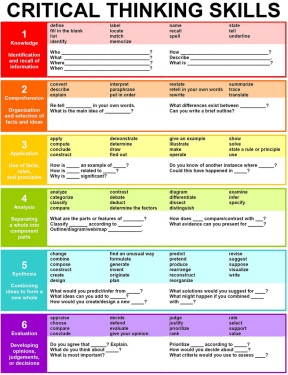EFL 6th graders are just that: 6th graders!
I bravely went into energetic positive teaching mood and began. At first he was he a little skeptical -the color review song wasn’t quite his thing. However, as the chant changed into a concentration word omitting game and we dove into the main part of the lesson, he quickly became just as engrossed as his classmates. (The teacher told me after class it seemed to be the most enjoyable class he’s had since arriving.) The reason? The challenge wasn’t only in the target English!
Just because our students can’t communicate very well in English yet doesn’t mean they are unintelligent. Sometimes it’s easy to get wrapped up in the games and lose sight of the fact that we shouldn’t judge their abilities and capabilities in other fields on their English proficiency. Our students are intelligent and are capable of higher order thinking and it’s alright to challenge them in those areas during English class through English.

What do I mean by critical thinking? Blooms taxonomy explains it very well; there are different levels of intellectual learning which build up one another and lead to mastery of material. Knowledge (remembering) is the lowest level of the pyramid. You cannot comprehend (understand) a topic without first remembering it, similarly you cannot apply this knowledge without first understanding it.
Our students already have fairly well developed critical thinking skills. -Think of their 11 year old counterparts in your home country. Think of the work your current students are able to produce in their Japanese classes. Why do we insist on keeping to the bottom tier of the pyramid? Is it because it’s difficult to work higher order critical thinking skills into the lesson? Perhaps, but it’s not as difficult as you think.
Next time you ask your students about the weather why not have them think about the weather in another country. How’s the weather Brazil in July? (Probably not what many of them are thinking since it’s in the southern hemisphere!). Next time you ask them “What kind of music do you like?” try following it up with “why?” Get them to think about their answers.
This is also very important at the JHS level! Why not ask them to paraphrase or summarize what they heard/read instead of the same old fill in the blank content questions?
-Happy Teaching!
This entry was posted on June 19, 2012 by aletcher89
photo credit: <a href=”http://www.flickr.com/photos/vblibrary/4576825411/”>Enokson</a> via <a href=”http://photopin.com”>photopin</a> <a href=”http://creativecommons.org/licenses/by-nc-nd/2.0/”>cc</a>